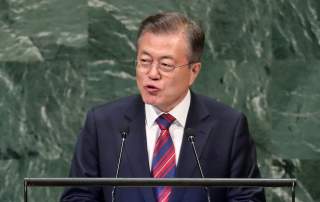The Hanoi Summit – We Asked Daniel DePetris What Happens Next in U.S.-North Korea Relations
"Trump’s tendency for unpredictability and the looming influence of National Security Adviser John Bolton could substantially worsen an already difficult situation."
Editor’s Note: Looking for more opinions on where we go after the Hanoi summit? Check out all 80 expert takes on where U.S-North Korea relations go next here.
The lack of a nuclear agreement in Hanoi, Vietnam, last month was certainly disappointing, but not at all surprising. While President Donald Trump and North Korean leader Kim Jong-un have struck a conciliatory personal relationship with one another, a solid rapport can only go so far when the bottom line positions of both sides remain irreconcilable. The question, of course, is where do things go from here?
We are unlikely to see a full breakdown of U.S.-North Korea relations. Trump and Kim continue to be personally invested in the nearly year-long detente; the last thing either wants is a full-blown crisis leading to what could eventually result in a deadly miscalculation. The fact that the U.S. and North Korean delegations didn’t storm out of the talks in Hanoi and flew back to their respective capitals with an unwritten agreement to continue a freeze on large-scale military exercises and ballistic missile testing are encouraging signals for the survival of the process.
This, however, doesn’t mean there won’t be problems in the interim. Reports of the Sohae Satellite Launching Station returning to normal operational status can only be taken as a message from Pyongyang that Kim’s patience is not unlimited. Trump’s tendency for unpredictability and the looming influence of National Security Adviser John Bolton could substantially worsen an already difficult situation.
The truth is none of us can say for certain where U.S.-North Korea relations are going or whether the detente will last for another year. But we do know what both parties must do in order to maintain a degree of calm and stability: stop pushing for maximalist demands that are simply unrealistic in the short and medium term; keep lines of communication open at all levels of the decisionmaking process; come to the realization that peace on the Korean Peninsula is even more important than the fantasy of denuclearization; and above all, recognize that returning to the bad, old days of “fire and fury” is a recipe for potential disaster.
Dan DePetris is a Fellow at Defense Priorities as well as a columnist for the Washington Examiner and The American Conservative. You can follow him on Twitter at @DanDePetris.
Image: Reuters

